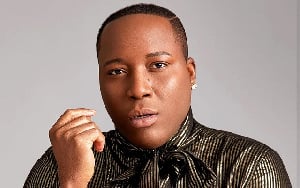Charlie Dior, a prominent figure in Ghana’s fashion scene as a stylist and influencer, recently addressed long-standing rumors about his sexual orientation during an interview on the ‘Girls Aloud’ podcast. The question, posed directly by one of the hosts, delved into a topic that has been a persistent undercurrent in public discussions surrounding Dior. While known for his confident and forthright demeanor, Dior exhibited a moment of hesitation before responding thoughtfully. His answer, however, was less a revelation and more a reflection on the socio-cultural landscape of Ghana. He expressed his belief that Ghanaian society isn’t prepared for open conversations about sexual orientation and identity, emphasizing that his reluctance to directly address the rumors stems not from personal discomfort, but from a concern for the potential repercussions in a society deeply rooted in traditional values.
Dior’s statement, “I don’t think Ghana is ready for that conversation,” encapsulates the complexities of navigating personal identity within a conservative cultural context. He highlighted the potential for misunderstanding and backlash, suggesting that forcing a dialogue on a topic society isn’t equipped to handle could be counterproductive. This cautious approach underscores the precarious position of individuals who may identify as LGBTQ+ in Ghana, where societal norms often stigmatize and marginalize those who deviate from traditional expectations. His comment, “It’s not about me; it’s about the readiness of the society I’m part of. I won’t have a conversation that people aren’t prepared to handle,” reflects a strategic awareness of the potential risks associated with open discussions about sexuality in a society where such topics remain largely taboo.
Ghana’s cultural fabric, woven with traditional beliefs and values, often views homosexuality as a deviation from accepted norms. This deeply ingrained conservatism makes open discussions about sexual orientation and gender identity difficult, often leading to discrimination and marginalization of LGBTQ+ individuals. Dior’s observation about Ghana’s unreadiness for such conversations highlights the challenges faced by those who identify as LGBTQ+ within this context. They often find themselves navigating a social landscape fraught with prejudice and misunderstanding, where openly expressing their identities can carry significant personal and social costs. This environment fosters a culture of silence and secrecy, forcing many to conceal their true selves for fear of reprisal.
Dior’s careful phrasing, while declining to explicitly confirm or deny the rumors, subtly acknowledges the pressure he faces as a public figure. He strategically avoids feeding into the speculation, recognizing the potential for his words to be misinterpreted or used against him in a society where acceptance of LGBTQ+ individuals remains limited. His statement suggests an understanding of the delicate balance he must maintain between personal expression and navigating the sensitivities of his cultural context. This balancing act is a common experience for many LGBTQ+ individuals in conservative societies, who must constantly assess the risks and benefits of self-disclosure.
Despite the persistent rumors and societal pressures, Dior maintains a focus on his professional identity and achievements. His statement, “People will always have something to say, but that doesn’t define who I am or my work,” emphasizes his commitment to his career as a stylist and influencer. He chooses to deflect the attention away from his personal life and towards his professional contributions, asserting that the speculation surrounding his sexual orientation does not diminish his accomplishments or his value within the fashion industry. This resilience demonstrates a determination to define himself on his own terms, rather than allowing public opinion to dictate his narrative.
In essence, Charlie Dior’s response to the rumors surrounding his sexual orientation is a nuanced reflection of the complexities of being an LGBTQ+ individual in a conservative society like Ghana. He navigates the conversation with a delicate balance of acknowledging the societal constraints while maintaining his personal agency. By choosing not to directly address the rumors, he avoids potentially fueling further speculation and protects himself from potential backlash. His focus remains on his work and his contributions to the fashion industry, demonstrating a commitment to his professional identity despite the pressures and scrutiny he faces. His approach exemplifies the strategic choices individuals often make in navigating social environments where open discussions about sexuality are fraught with challenges and risks.


